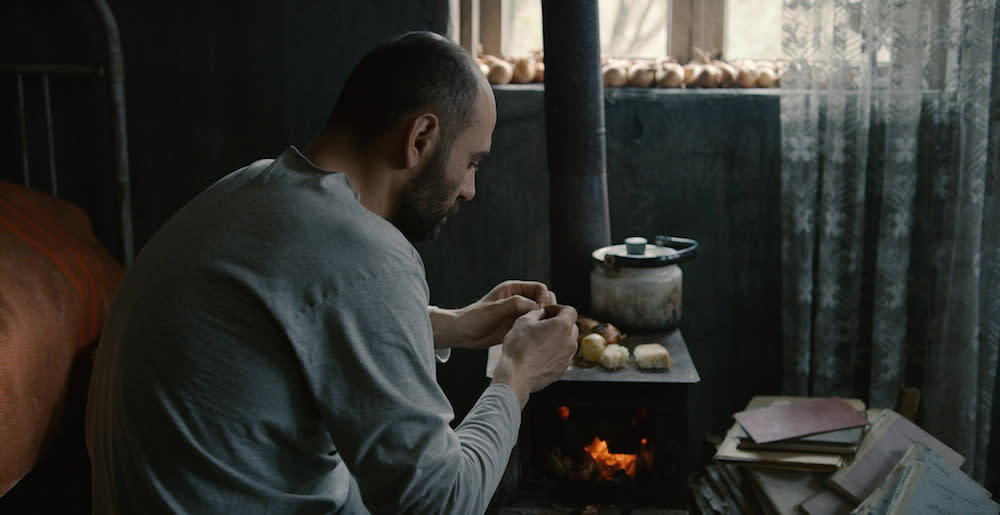Film Review: ‘Horizon’

Although Georgian women may not be marking a #MeToo moment in quite the same way as their counterparts in the U.S. and Western Europe, recent Georgian features such as Nana Ekvtimishvili and Simon Gross’s “My Happy Family” and Ana Urushadze’s “Scary Mother” have given their countrymen’s patriarchal attitudes a drubbing. Now, the naturalistic, melancholy-infused, observational drama “Horizon” from multi-hyphenate Tinatin Kajrishvili (a producer on “Scary Mother”) shows a discarded husband literally pining away of heartbreak, a fate usually reserved for female characters. This accomplished, absorbing, even-handed look at the pain of a marital breakup should broaden the director’s fan base on the festival circuit.
Immature, idealistic Tbilisi designer Giorgi (George Bochorishvili), known to his friends and former wife as Gio, can’t come to terms with the fact that pretty, cosmopolitan Ana (Ia Sukhitashvili) has called it quits on their marriage. He behaves as if the only thing required is some time and some flowers, and then he will be able to return from the inconvenience of his mother’s spare room to the nuclear family flat where Ana remains with their two young sons. But, in fact, Ana is already seeing someone new. And she wants to be very adult and civilized about it, something that hot-headed Gio can’t handle at all.
Spinning out of control, Gio runs from the city, just about as far as he can go. He winds up on a remote, extreme weather-wracked island in Paliastomi Lake, near the Black Sea, where he holes up in a broken-down hut on loan from a friend. In this isolated place, the pace of life is slow and the kindly attentions of the hardy souls dwelling there supply a balm of sorts for his wounded psyche. But Gio is unwilling to be distracted by duck hunting or fishing. Eventually, his mistaken belief that Ana will recall him from this voluntary banishment leads to a further and fatal loss of self.
As with her feature debut, the atmospheric “Brides” (which earned the Panorama Audience award at the 2014 Berlinale), Kajrishvili once again proves herself a canny observer of intimate relationships and their fracture points. While astute audiences will understand ahead of time why Ana wants to meet Gio in person once again, it’s incredibly painful to witness his misapprehension. But Kajrishvili credibly resists making Ana a villainess or Gio a complete fool.
In contrast to Ana and her slick, new, business-suited fellow, Gio’s neighbors on the island are the salt of the earth. Sportsman Jano (Jano Izoria) comes and goes on his boat, but elderly chicken farmer Valiko (Soso Gogichaishvili), wise widow Larissa (Nana Datunashvili) who is in touch with the traditional ways, and attractive younger worker Marika (Lika Okroshidze) have formed an alternative family structure to support and care for one another. They look out for Gio, but he is mostly too caught up in his internal angst to want to evolve into a spot in their tight unit.
The screenplay by Kajrishvili and her husband David Chubinishvili, who also co-wrote “Brides,” takes a surprising O. Henry-like turn in the last minutes that offers an alternate view of circumstances. The questions it raises should inspire avid audience discussion at the end. As a director, Kajrishvili elicits performances that are nuanced and uniformly strong throughout.
The beauty and remoteness of the island location inspires a natural production design that is much more primal than anything that Gio would have dared to design in the city. In addition to the changing beauty of the seasons, cinematographer Irakli Akhalkatsi (who also edits) makes striking use of fire, ice, massive waves, and deep columns of snow.
Related stories
European Industry Says 'Enough of Dismissing Harassment,' Launches New Initiative
Women on the Verge of Catalonia's Breakout
Catalan Secession Move and Federal Takeover Costs Film Biz
Subscribe to Variety Newsletters and Email Alerts!

